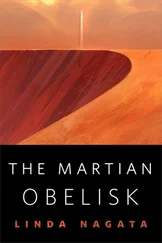Renée closes her compact with a click. “What’s that?” she asks in a delicate silvery-clear soprano. “What is it you want?”
Eduard gapes. He no longer knows what to think. “You haven’t been overworking, have you, Herr Knobloch?” Georg asks. “You seem to be suffering from hallucinations.”
“But someone here just—”
“You’re out of your mind, Eduard,” I say. “You’re not looking well either. Take a vacation. We have no wish to sell your relatives a cheap headstone of imitation Italian marble, and that’s certainly all you’re worth—”
Eduard blinks his eyes like an old horned owl. “You seem to be a strange sort of person,” says Renée de la Tour in her flutelike soprano. “You hold your guests responsible for the fact that your waiters can’t hear.” She laughs, an enchanting swirl of bubbling silvery music like a forest brook in fairy tales.
Eduard clasps his forehead. His last support has collapsed. It cannot have been the young lady either. Anyone who laughs like that can’t have a barrack-room voice. “You may go now, Knobloch,” Georg remarks casually. “Or did you intend to join in our conversation?”
“And don’t eat so much meat,” I say. “Perhaps that’s what’s wrong. Remember what you were saying to us a few minutes ago? According to the most recent scientific investigations—”
Eduard turns quickly and rushes off. We wait till he is some distance away. Then Willy’s great body begins to quiver with soundless laughter. Renée de la Tour smiles gently. Her eyes are sparkling.
“Willy,” I say, “I’m a superficial sort of fellow and therefore this has been one of the finest moments of my young life—but now tell us what’s going on!”
Willy, shaking with silent merriment, points to Renée, “ Excusez, Mademoiselle ,” I say. “ Je me —”
Willy’s laughter redoubles at my French. “Tell him, Lotte,” he bursts out.
“What?” Renée asks with a gentle smile in a soft, growling bass.
We stare at her. “She is an artist,” Willy gasps. “A duettist. She sings duets. Do you understand now?”
“No.”
“She sings duets. But alone. One verse high, one low. One soprano and one bass.”
A great light dawns. “But the bass—?” I ask.
“Talent!” Willy explains. “And then of course practice. You must hear her sometime when she does a spat between husband and wife. Lotte is fabulous.”
We agree. The goulash appears. Eduard sneaks around at a distance watching our table. His mistake is that he always wants to find out why something happens. That spoils his poetry and makes him distrustful in life. At the moment he is brooding over the mysterious bass voice. He doesn’t know what lies ahead of him. Georg Kroll, a cavalier of the old school, has invited Renée de la Tour and Willy to be his guests to celebrate our victory. Later, in payment for our excellent goulash, he will hand the infuriated Eduard four bits of paper whose combined worth today would hardly buy a couple of soup bones.
It is early evening. I am sitting beside the window in my room over the office. The house is low, angular, and old. Like this Whole part of the street, it once belonged to the church that stands in the square at the foot. Priests and church officials used to live in it; but for sixty years it has belonged to Kroll and Sons. The property consists of two low houses joined by an arched entryway; in the second lives Knopf, the retired sergeant major, with his wife and three daughters. Then comes the beautiful old garden with our array of tombstones, and behind that at the left a kind of two-story wooden coach house on the ground floor of which Kurt Bach, our sculptor, has his workroom. He models mourning lions and mounting eagles for our war memorials and he draws the inscriptions on the tombstones which are later chipped out by the masons. In his free time he plays the guitar and wanders and dreams of the gold medals which at some future date will be awarded to the renowned Kurt Bach. He is thirty-two years old.
The upper floor of the coach house is rented to the coffin-maker Wilke. Wilke is an emaciated man, and nobody knows whether he has a family or not. Our relations with him are friendly, resting on mutual advantage. When we have a brand-new corpse not yet provided with a coffin, we recommend Wilke or tip him off; he does the same for us when he knows of a body that has not yet been snapped up by our competitors’ hyenas; for the battle for the dead is bitter and is fought tooth and nail. Oskar Fuchs, the traveler for Hollmann and Klotz, even resorts to the use of onions. Before going into a house where there is a corpse, he gets out a couple of cut onions and smells them until his eyes are full of tears—then he marches in, proves his sympathy for the dear departed, and tries to make a sale. For this reason he is called Weeping Oskar. It’s a strange fact that if the survivors had only paid half as much attention to many of the departed when they were still alive as they do when it no longer matters, then the corpses would most certainly have foregone the most expensive mausoleum—but that’s what mankind is like: they only prize what they no longer possess.
Silently the street fills with the transparent smoke of twilight. There is already a light in Lisa’s room, but this time the curtains are drawn, a sign that the horse butcher is home. Next to her house lies the garden of Holzmann, the wine merchant. Lilacs hang over the wall and from the cellars comes the fresh vinegary smell of the casks. Through the gate of our house marches the retired sergeant major, Knopf. He is a thin man and he wears a cap with a visor and carries a walking stick; despite his profession and although he has never read any book except the drill manual, he looks like Nietzsche. Knopf goes down Hackenstrasse and at the corner swings to the left into Marienstrasse. Toward midnight he will return, this time from the right—that will mean he has completed methodically, as befits an old military man, his circuit through the inns of the city. Knopf drinks nothing but corn schnaps, Werdenbrücker schnaps to be exact, nothing else. But on that subject he is the greatest connoisseur in the world. There are in the city some three or four firms that distill schnaps. To us they all taste more or less alike. Not so to Knopf; he can distinguish them even by smell. Forty years of unwearying application have so refined his taste that when it’s a question of the same brand he can tell which inn it comes from. He maintains that there are differences between the inns’ cellars and he can tell them apart. Naturally not with bottled schnaps, only with schnaps in the cask. He has won many a bet on it.
I get up and look around my room. The ceiling is low and slanting and there is not much space, but I have what I need—a bed, a shelf of books, a table, a couple of chairs, and aa old piano. Five years ago, when I was a soldier in the trenches, I never thought I would be so well off again. At that time we were in Flanders; it was the big attack on Kemmelberg, and we lost three-quarters of our company. On the second day, Georg Kroll was taken to the hospital with a stomach wound, but almost three weeks passed before I was knocked out by a shot in the knee. Then came the collapse, and I finally became a schoolmaster as my sick mother had wished and as I had promised her before she died. She was sick so often that she thought if I had an official position with life tenure nothing bad could happen to me any more. She died in the last months of the war, but I took my examinations just the same and was sent to a village on the heath, where I stayed till I grew sick of dinning into children things I did not believe myself and being buried alive amid memories I wanted to forget.
I try to read, but it is no weather for reading. Spring makes you restless, and in the twilight it is easy to lose yourself. There are no boundaries then and you feel breathless and confused. I turn on the light and at once feel more secure. On the table lies a yellow portfolio with the poems I have pecked out in triplicate on the Erika typewriter. From time to time I send a few of these to the newspapers. They either come back or there is no answer; then I peck out new copies and try again. I have only twice succeeded in publishing anything in our local newspaper, and then, to be sure, with Georg’s help, for he knows the editor. Nevertheless, that was enough for me to be made a member of the Werdenbrück Poets’ Club, which meets each week at Eduard Knobloch’s in the Old German Room. Eduard recently tried to have me expelled because of the coupons, alleging moral turpitude; but the club declared, in opposition to Eduard, that I had behaved most honorably, just as the business and industrial leaders of our beloved fatherland had been doing for years—and, besides, art had nothing to do with morals.
Читать дальше








